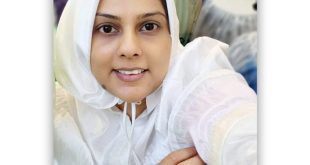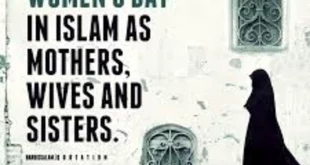
Dr Hassan al-Turabi from Sudan is one of the world’s leading living scholars of Islam. In addition to a traditional Islamic education, he holds a Bachelors degree in Law from the University of Khartoum, a Masters from the University of London and a PhD from the Sorbonne, Paris. He has served Sudan as Speaker of parliament, Attorney General, Minister of Justice, Minister of Foreign Affairs and Deputy Prime Minister and is currently the opposition leader.
“Muslims who advance conservative views on female affairs…are normally very literal in their understanding of texts; but they tendentiously opt for an understanding that suits their prejudice.” – Dr. Hassan Al-Turabi
CHAPTER I: THE VERDICT OF FAITH
In the religion of Islam, a woman is an independent entity, and thus a fully responsible human being. Islam addresses her directly and does not approach her through the agency of Muslim males. A woman would assume full capacity and liability once she has attained maturity and has received the message of Islam.
Moreover no woman is said to have truly accepted the message of Islam unless she does so out of original and independent will. Admission to faith is entirely a personal matter; indeed, faith cannot be adopted by proxy. Nor does a woman become a Muslim merely because of her relationship to father, husband or any other male. All Muslims used to present their oath of allegiance to the Prophet Muhammed (peace be upon him) personally and independently. Women, just like men, would come to the Prophet (peace be upon him) and pledge their own allegiance to Islam and the Prophet.
God Almighty commanded the Prophet (peace be upon him) in the following words: “O Prophet! when women believers come to you to make a covenant with you that they will not associate anything with God, nor steal, nor fornicate, nor kill their own children, nor slander anyone, nor disobey you in any fair matter, then make a covenant with them and seek God’s forgiveness in their favour. Indeed God is extremely Forgiving and most Merciful”. (Al-Mumtainah, 12).
Male and female relatives may assume different stands over the religious option. For instance, a woman like Fatima the daughter of Al Khattab, embraced Islam although her brother Umar was still an unbeliever. Ibn Abbas is reported to have asked Umar about the manner in which he embraced Islam. Umar said, “three days after Hamza had embraced Islam, I went out of my house, to meet by chance a man of the Makhzumi tribe whom I asked: “Do you prefer Muhammad’s faith over that of your own forefathers?” The Makhzumi said: “One who is more closely related to you than myself has also done so”. I asked him, who it was. Your sister and your brother-in-law, replied the Makhzumi. I hurried back and found the door of my sister’s house bolted from within; and I heard some humming inside. Later, when the door was opened, I entered the house and asked: What is it that I am hearing? My sister replied: “You heard nothing”. We were exchanging words when I struck her on the head, whereupon she stated defiantly: “We do that whether you like it or not”. I was filled with remorse when I saw her bleeding, and said to her: “Show me the scripture”. Umar narrated the whole incident. (Al-Isabah Fi Tamyeez Al Sahaba, by Ibn-Hajar Al Asqalani, hereafter cited as Al-Isabah).
Similarly a woman, like Umm-Habiba, the daughter of Abu Sufiyan, embraced Islam, though her father was still a pagan. When Sufiyan went to Madina, he visited his daughter, Umm-habiba, then wife of the Prophet Muhammad (peace be upon him). He was about to sit on the Prophet’s bed but his daughter did not allow him to do so and rolled up the mattress. Abu Sufiyan, who felt grieved at her attitude, said to her, “Was it that the mattress is not worthy of me or that I am not worthy thereof”? Umm-Habiba curtly replied to her father, Abu Sufiyan, “But this is the Prophet’s mattress, and you are an impure polytheist, I did not want you to sit on it.” When he heard that, Abu Sufiyan felt annoyed and reprimanded her, “During my absence something has gone wrong with you.” (Tabaqat, Ibn-i-Saad).
A Muslim woman might have a husband who was still an atheist. Take, for instance, Zainab, the daughter of the Prophet himself (peace be upon him). She was married to her maternal cousin Abu Al-A’s bin Al Rabee. She entered the fold of Islam though her husband held on to his original religion. In the battle of Badr, he fell prisoner of war. Zainab, however, offered a ransom for his release. He was, therefore, allowed to go free on the engagement that on his return he would let her free. Consequently, when he returned to Mecca, Zainab migrated to Madina. Her husband, Abu Al-A’s, however, once again fell in the hands of Muslims as a prisoner of war. On this occasion Zainab provided him with asylum, and took him under her own protection. He finally returned to Mecca to settle his business and then embraced Islam.
Umm-Saleem bint Mahan was another such lady. She married Malik bin Al Nadir before the advent of Islam but was among the earliest converts to Islam. Her husband, Malik disapproved of that rather furiously and went to Syria to die there. (Al-Isabah)
Umm-Hani bint Abi Talib was married to Hubairah bin Amr. She was the daughter of the Prophet’s uncle, Abu Talib, and embraced Islam on the occasion of the conquest of Mecca. This change of religion separated her from her husband, Hubairah, who fled to Najran. (Al-Isabah)
Hawa bint Yazeed was yet another woman who acceded to Islam and patiently endured distress and torture at the hands of her husband, Qays bin Al Hateem, who was also a well-known poet. The Prophet (peace be upon him) happened to meet him in the market (Souq dhi’l-Majaz) and asked him to embrace Islam. He claimed that since he was too busy with war, he had little time to consider the proposal. The Prophet (peace be upon him) said to him, “I have been told that you are not treating your wife, Hawa, nicely ever since she renounced your religion. So fear God and in this matter keep me too in regard, don’t bother her.” He promised to oblige; then went to his wife and said to her, “O Hawa, I met your fellow Muhammad, who asked me to bear him in mind in matters concerning you. I swear by God I shall do so, I would leave you alone and do you no harm.” She, then, declared her faith which she had so far kept secret. People talked to him about the matter, but he refused to do her any wrong. (Tabqat).
Another woman, Umm-kulthoom bint Ugba bin Abi Mait embraced Islam, though her whole family were still holding on to their original polytheistic religion. She migrated to Madina. Ibn Ishaq, a well-known historian, said that Umm-kulthoom migrated to the Prophet at Madina while the peace settlement of Hudaibia was still operative. In fact she was the first lady to follow the Prophet (peace be upon him) to Madina. She left Mecca unaccompanied by any one. Her brothers, Amara and al Waleed went to the Prophet (peace be upon him) and asked him for her repatriation as provided in the agreement between the Prophet and Quraish: an Arab people of which Muhammad was a member and which from the 5th century was distinguished by a religious preeminence associated with its hereditary provision of the pre-Islamic custodians of the Kaaba at Mecca The Quraysh was an Arab tribal confederation that historically inhabited and controlled the city of Mecca and its Ka'aba. In the late 6th-century More at Hudiabiya. But the Prophet refused to extend the terms of the agreement to women. (Tabqat).
A woman could singly adopt Islam and suffer from torture for that. Harithah bint Al Muammil, the sister of Umm-Ubais who was known as Zunairah Al Romiyah, was a slave girl. She was among the earliest believers in Islam and was one of those women who were tortured for their faith. Abu Jahal used to beat her severely; so did Umar before he embraced Islam. After embracing Islam the poor woman suffered so much torture that she lost her sight. The Meccan polytheists used that misfortune as an excuse for stigmatizing her for embracing Islam. They, used to say, “al Lat and Al Uzza (two deities which the Meccans used to worship in the holy Kaba) have rendered you blind”. But she would always say, “They are lying, by the truth of God these idols bring no benefit nor harm.” She ultimately recovered her sight.
Sumayah bint Khubat, a martyr, was the mother of Ammar bin Yasir, and was the seventh person to embrace Islam. The Al Mughira clan used to torture her. People used to pass by and witness her being tortured by the side of her son and husband in the hot sands of Mecca. The Prophet (peace be upon him) would console her by saying, “O the Yasirs, bear this suffering patiently, for God has given you the promise of heaven”. She was aged, and weak too. Abu Jahl was also among those who used to torture her. She succumbed to the excessive torture and died to become the first person ever to suffer martyrdom in Islam. (Al Isabah)
Umm-habibah, the daughter of Abu Sufiyan was a lady who in exile firmly held on to Islam while her husband had converted to Christianity. Her husband Ubaid-ullah bin Jahash migrated to Abyssinia, along with his wife to escape persecution for their Islam. But there he renounced Islam and adopted Christianity, the religion of the Abyssinians. He tried to persuade her to do the same, but she steadfastly held on to Islam on top of all the suffering which as an exile she had to bear. (Tareekh Al Tabari)
Muslim women, on the strength of their unshakable personal faith, used to work for the propagation of Islam. many of them helped to promote the cause of Islam within their respective family circles, through discussion and debate. Arwa bint Abdul Muttalib was one such lady who used to support the Prophet (peace be upon him) and to argue in his favour. She always urged her son to help the Prophet (peace be upon him) and to do whatever he asked him to do. Another such lady was Um Shuraik who used to move secretly among the ladies of Quraish: an Arab people of which Muhammad was a member and which from the 5th century was distinguished by a religious preeminence associated with its hereditary provision of the pre-Islamic custodians of the Kaaba at Mecca The Quraysh was an Arab tribal confederation that historically inhabited and controlled the city of Mecca and its Ka'aba. In the late 6th-century More to solicit and convert them to Islam. She had converted many before she was exposed. The people of Mecca warned her that she would have suffered but for her kin. (Al Isabah)
Among Muslim ladies were some who invited their suitors to embrace Islam and made that a precondition for marriage. Umm-Saleem was one such lady. She said to Abu Talha, who asked her hand in marriage, “By God one like you can not be rejected, but you are a polytheist and I am a Muslim Woman. It is not at all lawful for me to marry you. If you embrace Islam, I would take that as my dowry from you”. Anas bin Malik is reported to have said that Abu Talha had proposed to Umm-Saleem before embracing Islam. So she said to him, “Abu Talha don’t you know that the God you worship grew from the earth”? Abu Talha replied, “Yes, indeed”. She would then say: “Don’t you feel ashamed to worship them? but if you embrace Islam I won’t ask you anything else in dowry”. Abu Talha asked her to wait till he looked into the matter, and went away. Later he returned and proclaimed, “There is no deity but God and Mohammad is his messenger”. Thereupon Umm-Saleem cried out, “O Annas arrange the marriage of Abu Talha”. And he married her. (Al Isabah)
If embracing Islam by a woman is an entirely personal matter in the Islamic tradition and can not be done through proxy, so are all obligations and duties which Islam enjoins on her. No one else can do them on her behalf. She performs her acts of worship purely on the basis of her own intention; and as such these are treated in Islam as her personal achievements. For God has proclaimed, “I do not allow the achievement of a worker, from amongst you, whether he be male or female, to go to waste. You all belong to one another”. (Al-Imran 195). “A male or female, who is a believer and performs good deeds, we shall give him a goodly life. And ultimately a fine reward for what they had been doing”. (Al Nahal 97)
On the basis of her own action, a woman earns reward or punishment. No man is allowed to plead or intercede for a woman, nor is he held responsible for her actions and their consequences. The doctrine of ultimate accountability does not take the family as a unit for collective responsibility; rather, each individual male or female, is an autonomous unit of reckoning in front of God, and is held directly responsible for his or her actions or his or her share in joint acts. “For, on the Day of Judgement, every one of them will come to Him singly”. (Maryam, 96)
The judgement in the hereafter may not necessarily bracket husband and wife together; neither could relieve the other of his charge or appropriate his due. Nor will a believer be treated unfairly merely for his sex. God treats all mankind on an equal basis. “The Day a man will run away from his own brother, his own father, his own wife and his children. On that day every one will be in a state which will engross him completely”. (Abasa, [35-38])
The individuality of a woman is a principle of religion, “For the disbelievers, God gave the example of Noah’s wife and Lot’s wife. Both of them were under two of our righteous bondmen. Both acted disloyally towards them, but (their esteemed husbands) could in no way protect them from God. And both were commanded to enter the fire (of hell) along with all others following the same course. And for those who believed, God gave the example of Pharaoh’s wife, when she prayed: “O Lord, put up for me a home in heaven, and save me from the Pharaoh and his practices and save me from the transgressing people”. And Mary the daughter of Imran who guarded her chastity, wherein we breathed of our Spirit. And she attested to the commandments of her Lord as well as his scriptures, and was one of the truly devout. (Al Tahreem, 10-12)
Please click here to read other chapters
CHAPTER II: THE VERDICT OF JURISPRUDENCE
CHAPTER III: WOMEN IN MUSLIM SOCIETY
CHAPTER IV: THE RESURGENCE OF WOMEN
 Sri lanka Muslims Web Portal Diversity and Inclusiveness
Sri lanka Muslims Web Portal Diversity and Inclusiveness




If the following statement attributed to Al-Turabi is true, then he cannot be considered a Muslim scholar (leave alone calling him a leading Muslim scholar)
” During an interview on Al-Arabiya TV in 2006, Al-Turabi describes the requirement of hijab as applying only to the Prophet’s wives, saying hijab was “a curtain in the Prophet’s room. Naturally, it was impossible for the Prophet’s wife to sit there when people entered the room.”
Source: http://en.wikipedia.org/wiki/Hassan_al-Turabi